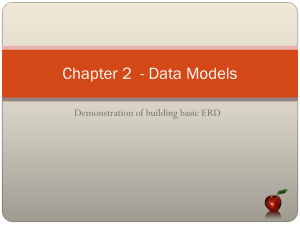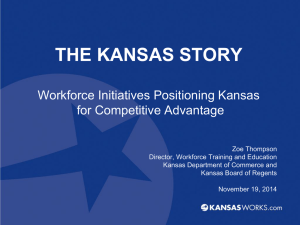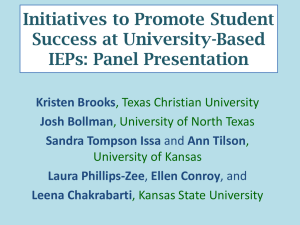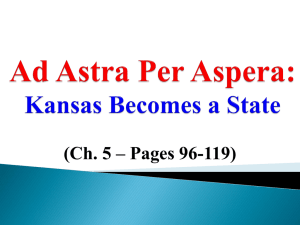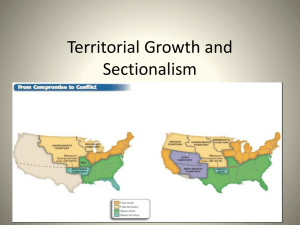UIFSA_101_for_KCSEA_2014 545.4 KB
advertisement
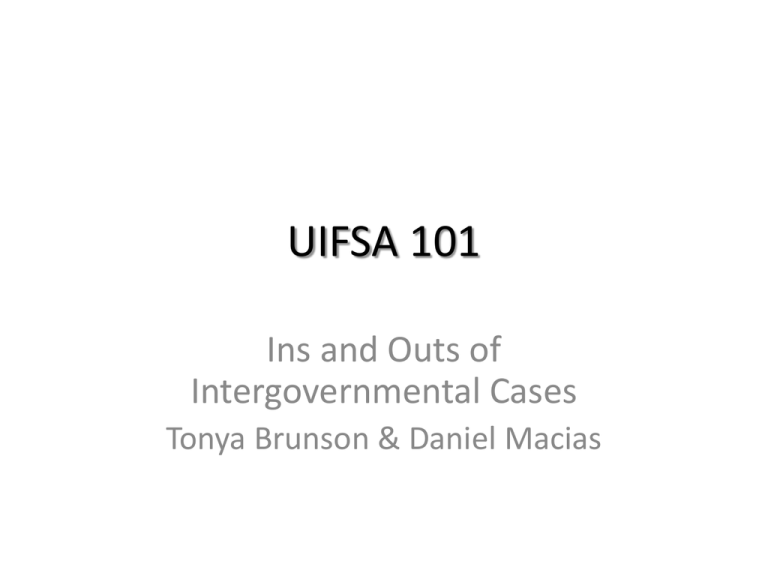
UIFSA 101 Ins and Outs of Intergovernmental Cases Tonya Brunson & Daniel Macias Overview • Brief History of Intergovernmental Cases • UIFSA Terminology • Three Procedures of UIFSA • Establishment • Enforcement • Modification • Future of Intergovernmental Cases History Prior Acts to Enforce CSO’s • Uniform Reciprocal Enforcement of Support Act (URESA) – Enacted in 1950 – Goal to allow/enhance CP’s ability to enforce NCP’s obligation across state lines. – Revised in 1968 (RURESA) to correct evidentiary problems – Created problem of multiple CSO’s • Full Faith and Credit for Child Support Orders Act (FFCCSOA) – Passed in 1994 – First attempt to resolve the problem of multiple CSO’s History, Part II • UIFSA—Uniform Interstate Family Support Act – Drafted in 1992 – Major component is the “one-order” rule – Made a requirement for States to pass UIFSA in 1996 by Congress (to obtain Federal funding) – Effective in Kansas July 1, 1994 – Two revisions—2001 & 2008 • Hague Convention on the International Recovery of Child Support (2007) UIFSA in Kansas • Still using 1992 Act • K.S.A. 23-36,101 et seq. • Procedural statute (Personal & Subject Matter Jurisdiction) Terminology (K.S.A. 23-36,101) • “Initiating State/Tribunal & Responding State/Tribunal” • “Home state” (Six months) • “Obligor/Obligee” = NCP/CP • “State” (Broad, inclusive) • “Support order” (also inclusive) More Terms • Registration (Article 6 of UIFSA) • Controlling Order • Continuing, Exclusive Jurisdiction (K.S.A. 23-36,205) • “Incoming” or “Outgoing” Three Procedures • Enforcement • Establishment • Modification ***Special Rules to expedite all procedures Establishment • When Kansas is the responding state… – Forms • Uniform Support Petition, • General Testimony • Affidavit in Support of Establishing Paternity – Choice of Law: Kansas K.S.A. 36,23-303 & 701 (Content of Documents must comply with Kansas law.) • When Kansas is the initiating state… – Long-arm Jurisdiction or “Outgoing UIFSA”? EST: Long-arm Jurisdiction • K.S.A. 23-36,201 – Personal service in Kansas – Submission to jurisdiction in Kansas – NCP resided with the child in Kansas – NCP resided in Kansas and provided prenatal expenses or support for the child – Child resides in Kansas as a result of acts or directives of the NCP (See McNabb v. McNabb, 31 KanApp 2d 398, 65 P.3d 1068 (2003)) – Conception in Kansas (“may have been”) – Putative father registry – Catch-all (Signing of Voluntary Acknowledgment?) Enforcement • Could NCP pay through an IWO? – If so, simply send IWO to employer (UIFSA sec. 501) • Registration (K.S.A. 23-36,601 et seq.) – Documents sent as directed by K.S.A. 23-36,602 • “Transmittal #1” • Two copies of CSO (one certified) • “Registration Statement” • Names and addresses of CP & NCP; SSN for NCP; In state property owned by NCP, if any • Arrearage statement – To be registered in appropriate responding tribunal as a foreign judgment – To be enforced as a judgment in this state Enforcement (Continued) • Service upon NCP and NCP’s right to contest – Personal service or registered mail (First class mail not allowed—K.S.A. 23-36,605(a)) – NCP has 20 days to object. Failure to object will result in confirmation of order and arrearages. – If NCP does contest, defenses are limited • • • • Fraud Vacated, suspended, modified or stayed “Defense under the law of this state” Dormancy (See next slide) – Nonparentage is NOT a defense (K.S.A. 23-36,315) Enforcement (End of the line) • Choice of Law (K.S.A. 23-36,602) – Nature, extent, amount and duration of payments: the initiating state (See In re Marriage of Riggle, 30 KanApp. 2d 967, 52 P.3d 360 (2002)) – Statute of Limitations (Dormancy): the state with the longer running statute (See Hale v. Hale, 33 KanApp. 2d 967, 108 P.3d 806 (2005)) Modification • Two Key Terms –Controlling Order –Continuing Exclusive Jurisdiction Still Modifying • Continuing exclusive jurisdiction (CEJ) When Kansas issues the [only] CSO for the child/ren, Kansas has CEJ over that CSO as long as one of the parties (CP, NCP or child/ren) resides in Kansas. If all parties subsequently move out of state, Kansas loses CEJ, but the Kansas CSO remains the controlling order. Still Modifying (2) • So if all parties move out of Kansas after the Kansas CSO was entered & filed, who can modify, and where? – The moving party must file the motion to modify in the other party’s home state. K.S.A. 23-36,611 • Gentzel v. Williams, 25 KanApp 2d. 552, 965 P.2d 855 (1998) • In re Marriage of Doetzl, 31 KanApp 2d. 331, 65 P.3d 539 (2003) • Okay, so now…what if there are two or more CSO’s from different states? That’s what UIFSA was designed to resolve, right? – See K.S.A. 23-36,207 or…. Special Rules (Article 3) • Physical presence of CP is not required for hearings, but if CP does appear, CP is immune from service of civil process for divorce, custody, etc. (Can still be served for unrelated acts.) • UIFSA forms are to be admitted as evidence. • CP to be allowed to appear by telephone (K.S.A. 23-36,315(f)) • Court may draw negative inferences from refusal to answer questions when testifying. • No spousal privilege Future of UIFSA • Global Child Support Enforcement? – Hague Convention – UIFSA 2008 – Dia v. Oakley, 42 KanApp. 2d 847, 217 P.3d 1010 (2009) • More interaction with Indian Nations Thank you! …Now go eat… Have a great weekend.

